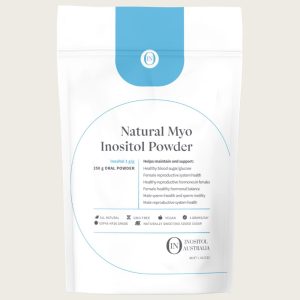If you have Polycystic Ovarian Syndrome (PCOS) or have recently been diagnosed with this medical condition, you are likely well aware of the symptoms that come with it as well as the negative side effects that might crop up due to available medical treatments.
While PCOS is not necessarily life-threatening, it could put a woman at risk for more serious conditions. Depending on the type of PCOS that an individual has or the severity of their symptoms, managing PCOS can be difficult but it is essential for better well-being and improved daily living.
Finding natural treatment may reduce the negative side-effects caused by prescription medicine and make living with PCOS more manageable.
Common Symptoms of Polycystic Ovarian Syndrome (PCOS)
PCOS is a hormonal disorder commonly found in women of reproductive age. PCOS generally affects how a woman’s ovaries function. They might cause prolonged periods, issues with infertility, and insulin resistance, among other issues.
There are three main features of PCOS:
- Irregular periods
- Excess androgen
- Polycystic ovaries
PCOS might be a genetic condition, or it might occur due to a body’s insulin resistance as the ovaries end up producing too much testosterone, interfering with follicle development and preventing regular ovulation.
Hormonal imbalances might also cause PCOS. Elevated levels of testosterone, luteinizing hormone (LH), prolactin (very rare), or lower levels of sex hormone-binding globulin (SHBG) may disrupt the normal hormone production.
Here are some common symptoms that women with PCOS may experience, regardless of the cause:
- Irregular periods or no periods at all
- Difficulty getting pregnant (because of irregular ovulation or failure to ovulate)
- Excessive hair growth (hirsutism) – usually on the face, chest, back, or buttocks
- Weight gain
- Thinning hair and hair loss from the head
- Oily skin or acne
Additionally, women who have absent periods or fewer than 3 or 4 periods a year are at higher risk of developing endometrial cancer because the womb lining is not being shed as frequently.
Reasons for PCOS Management
Since PCOS can present as a range of symptoms or just 1, the reasons for managing PCOS will vary from person to person. But, overall, managing PCOS symptoms will reduce menstrual fluctuations that can be associated with painful periods and reduce the associated negative risks.
Many women with PCOS will only discover that they have the condition when they are trying to get pregnant.
Since PCOS affects the rate at which a body produces eggs, and it disrupts normal menstrual cycle function, a woman with PCOS has a smaller window for getting pregnant. If this is the case, it is likely that she will need to manage PCOS symptoms in order to increase the chances of becoming pregnant.
Infertility, however, is not the only reason for managing PCOS. A woman with PCOS has a higher risk of developing type 2 diabetes, depression and mood swings, high blood pressure, high cholesterol, and sleep apnoea. Since these conditions could potentially be life-threatening, or extremely burdensome, it is in the best interest of the individual to get treated.
Additionally, PCOS might cause an increase in weight, so an individual who might be trying to lose weight could experience difficulty without treating the condition. Other reasons for managing PCOS would include reducing acne, controlling hirsutism, regulating periods and moods, and improving mental health.
Natural Remedies for PCOS-related Symptoms
The specific treatment recommended by your physician will depend on the PCOS symptoms displayed as well as any other risk factors that you have. Of course, no treatment options should be explored without consulting your physician.
The contraceptive pill, IVF, clomifene, metformin, and letrozole are commonly prescribed to regulate periods and improve fertility rates. But, it is important to know that natural remedies for PCOS do exist and are effective in minimizing the intensity and severity of symptoms.
Lifestyle Changes
One of the first things that a doctor is likely to recommend is a lifestyle change, especially if a woman is overweight. PCOS symptoms can improve with only a 5% weight loss and this loss drastically reduces the long-term health problems associated with PCOS.
Exercising regularly, eating a healthy diet, developing a regular sleep cycle, reducing stress, and drinking plenty of water daily can contribute to a lower BMI. You can also seek out a dietician for tailored recommendations. Upping your intake of foods rich in iron, magnesium, fiber, and anti-inflammatory properties can also contribute to a healthier lifestyle and ease symptoms.
Inositol
Inositol, which is largely derived from B vitamin, is also a natural way of controlling irregular hormones, insulin resistance, and inflammation. Inositol, which might be taken as Myo-inositol, D-chiro-inositol, or a combination of the two, are nine naturally occurring compounds that are somewhat effective at improving the chances of fertility.
Inositol has been shown to improve fertility in some women with PCOS since it can improve ovarian function, and it also may help prevent diabetes (and gestational diabetes, too). Some studies have found that Inositol provides a higher pregnancy rate than metformin; compared to metformin in a controlled trial, Inositol achieved a 30% pregnancy rate over 18%.
Other benefits of the Inositol may include reduced anxiety, controlled blood sugar, and reduced depression. These benefits are supported in the literature, but there is still much to be known about the nuances of Inositol’s effects on the body.
Adaptogen Herbs and Other Supplements
You might also try adaptogen herbs. Adaptogen herbs balance hormones related to sexual function, in this case, the androgens, and they might ease PCOS symptoms like irregular periods.
Caution should be used when taking herbal supplements as their health claims cannot be evaluated by the TGA. Speak with your doctor about using maca root, ashwagandha, holy basil, licorice root, chasteberry, or Tribulus Terrestris for improving PCOS symptoms.
Other supplements like berberine, chromium, cinnamon, and turmeric can contribute to stabilizing insulin resistance and decreasing inflammation. Alternatively, taking zinc might boost fertility and the immune system, as well as remove unwanted hair growth and alopecia.
Additional Treatments
While not entirely affective, taking in natural remedies can regulate some of the body’s natural processes to make them easier and more likely to function properly.
This might include things like acupuncture, which could increase blood flow to the ovaries, reduce cortisol levels, improve sensitivity to insulin, and manage weight loss.
Things to Avoid
When it comes to natural treatments, it’s a good idea to consider avoiding certain things that might increase risks related to PCOS. Reducing your caffeine and alcohol intake is a good way to improve insulin and metabolic function.
Additionally, it’s also a good idea to avoid endocrine disruptors. Endocrine disruptors like dioxins, phthalates, pesticides, BPAs, and glycol ethers can be introduced to the body through ingestion, inhalation, or topical application through skin or through hair products. Endocrine disruptors are chemicals and they will interfere with the body’s hormonal reactions. Essentially, they will mimic the sex hormones that normally regulate reproductive systems and cause confusion in the body.
Other things to be wary of include therapies that make claims that are too good to be true, and are often not regulated by the TGA.
These include:
- Systemic enzyme therapies
- Supplements/herbs that are will “cure all” or resolve your problems instantly
- Progestin, which might make it harder for you to become pregnant (and is often used as a form of contraception)
Managing PCOS Through Natural Treatment
No treatment for PCOS is considered to be one hundred per cent effective at regulating the menstrual cycle, improving the chances of getting pregnant, or reducing the negative symptoms.
The natural treatments that you use in order to manage the PCOS symptoms should be recommended and supported by your family doctor. That way the prescribed method is right for your unique needs. However, know that a natural treatment option for PCOS is not out of the question!



